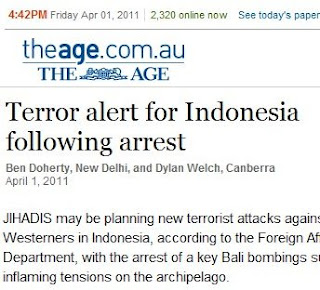
Terror alert for Indonesia following arrestGiven the immense dangers, it's refreshing to see a major newspaper use the word terror without planting it between quotation marks.
The Age, MelbourneJIHADIS may be planning new terrorist attacks against Westerners in Indonesia, according to the Foreign Affairs Department, with the arrest of a key Bali bombings suspect inflaming tensions on the archipelago. Umar Patek, south-east Asia's most wanted terrorist suspect and known in Indonesia as the ''Little Arab'', was arrested several weeks ago in Pakistan following a tipoff from the CIA. He is suspected to have been Jemaah Islamiyah's deputy field commander during the 2002 nightclub bombings in Bali and personally helped build the car bomb that ripped through the Sari Club. Indonesia's spy chief, Sutanto, said Umar Patek was captured following a violent raid, in which he was injured. His wife was also captured in the raid, he said. ''He has been arrested and he is currently in custody in Pakistan,'' Pakistani military spokesman Major-General Athar Abbas told The Age yesterday. But General Abbas declined to confirm reports coming from Pakistan that Patek had confessed to his role in the Bali bombings as well as disclosing details of further terrorist plots, including attacks targeting Australians."
Some news channels tend to follow a rule that says (to paraphrase) terror that impacts the other country's population may or may not be terror, we wouldn't know (might be militants, might be activists) and we wouldn't want to be judgmental. But terror that endangers our own innocent citizens - now that's real terror.
Two recent examples among many. Until it came under a barrage of criticism, CNN's initial reporting of the massacre of the Fogel family in the Israeli community of Itamar three weeks ago appeared under this cowardly headline:
And in Canada, the Toronto Sun (along with the New York Times and others) was not sure enough about a bombing in the center of Israel's capital city to use the word terrorist without those quote marks:
In a quotation that captures the spirit of terrorism denial, the French prime minister of the time, Raymond Barre called the attack "a heinous act against Jews in a synagogue that struck four innocent Frenchmen crossing the street."
What he and most others failed to understand at the time, and what many in the media and public life still do not adequately grasp, is that the terrorists see all of us, and certainly including their own people, as legitimate targets.
No one is caught in the crossfire of the terrorists because we are the targets. The targets of the terrorists are always innocent, and that certainly includes Israeli families even when they are living on disputed soil.



No comments:
Post a Comment